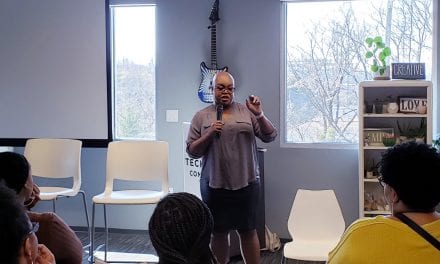The coronavirus pandemic has made the task of finding a good job in Middle Tennessee so much harder than before. Despite any negative reports coming from the press, job-seekers looking to survive the worst economy of recent memory will need to keep a healthy attitude and focus on their vocational goals.
The good news for the unemployed is that the economic stall caused by COVID-19 has provided time for employees to take stock of their job skills, and maybe work on a few initiatives related to their professional development. Enter VACO, a management consulting company whose global headquarters is in Brentwood, TN. They currently operate in 45 locations worldwide. And according to their website, they’ve served more than 9,000 clients, successfully placing more than 73,000 candidates for employment and consultants in positions of employment or gainful work.
This talent solutions company is oriented toward giving businesses the best human capital on the market. They try to figure out what the client company’s needs are and what the right approach might be to secure talent for them. Per the VACO website, these talents include the following touchpoints: technical accounting; accounting and finance; strategy and advisory services; cybersecurity operations; identity and access management; governance, risk and compliance; assurance, intel, and incident response; and application security expertise. Their site’s offer of “boutique services with global reach” sometimes includes a specific niche of skills.
Partner and Managing Director of Vaco Nashville’s Technology Practice Alex Naddell helms the endeavor to pair talented individuals with jobs that will be a great fit for them. He recently spoke to Launch Engine to offer some basic advice to help those sending out resumes to put their best foot forward.

For people dusting off their resumes and getting back to work, Alex says that there are several do’s and don’ts to consider.
DON’Ts
The first item Alex shares is: “Don’t make it a four page resume. That said, it also doesn’t have to fit on one page if you are experienced 10 plus years.”
“It really does depend on how much experience they have coming out,” Alex says. “It wouldn’t make sense for an entry-level person to have a four or five page resume, right? Or even a two or three-pager. It’s probably more of the brief, one page kind of summary that hits on the internships or projects that they’ve been involved with. Some education, schooling. Without a lot of demonstrable work experience, they’re going to need to put certifications in there—anything that kind of gives them street-cred to help build their case.” Alex explains that the goal is to make it “short and sweet,” so that it doesn’t feel like the resume has been padded. He says that the resume needs to be geared to the kind of job that the candidate is looking to get.
If, however, you’re a seasoned candidate with a substantial level of job experience, you shouldn’t be afraid to put more project detail into the resume. And, if you’ve been a part of noteworthy projects, then the resume is a perfect place to outline these endeavors tastefully. Just be sure to do it with specific metrics that will translate to the recruiter and without “company-specific vernacular” that may confuse them.
Alex states emphatically, “At the end of the day, as long as you’re providing value and not just putting in filler, I think that’s the key.” Although less common, he also stipulates that job candidates should “avoid writing long paragraphs” when writing their resume. Long paragraphs may come off as unreadable or off-putting to the recruiter. Simplicity and efficiency with the communication of your resume is essential.
The second of Alex’s admonitions to remember is: “Don’t have typos.” Sadly, Alex shares, this is more common than many people think. He explains, “A lot of technical people—developers and so-forth—I find that they maybe don’t put as much of an emphasis on the resume… What people need to realize is [that it is] a work sample… especially if you’re applying for a job and they don’t know who you are, that’s your first opportunity to demonstrate your work ethic, your attention to detail.”
He notes that typos in a resume may detract from the quality of the work experience in a recruiter’s eyes. Alex advises that you use your word processor’s spell-checking feature. In addition, a second set of eyes is always useful to help catch any mistakes related to grammar or accuracy.
Alex’s third don’t is to avoid “crazy formatting and images on it…unless you are a Graphic Designer.” The attempt to spice up the resume with pictures of the candidate or to impress a possible employer is inappropriate in a resume. In most cases, it’s also irrelevant to the position and doesn’t do the candidate any favors. Avoid “big, unusual fonts” or any urge that may have you “over-engineer the content.”

Alex’s final don’t is “don’t lie.” On that front, Alex notes, “People will over-embellish or put things on there that they actually haven’t done or don’t know anything about.” Whether or not it’s a blatant lie, if a candidate is discovered to have lied about their work experience that may lead to being blackballed from the company.
DO
For resume moves that may impress a potential recruiter, many of VACO’s recommendations are common-sense actions that will add value to your resume.
The first “do,” is (when you can) to make sure that you “use bullet points.” This will help make the resume more readable. It will also give your potential new employer the impression that you are considerate and serious about the position.
You’ll also want to “include some greatest accomplishments,” things that you’ve done that are directly relevant to the position, or at least have enough relevance to make your resume stand out from the others.
In terms of skills, you’ll want to “list technologies with which you are proficient.” For anyone unfamiliar with the Nashville tech scene, .NET Framework has a massive presence. Alex shares that several of VACO’s clients have moved towards MEAN or MERN stacks, as well as REACT JS, ANGULAR JS, and NODE JS, and that there’s “still plenty of JAVA work in town.” He also shares that the en vogue fields of data science, business intelligence, and cybersecurity are worth looking at for growing into a career.

Anyone wanting to break into a career in technology could do so if they’re willing to learn the skill sets and take the time to get the necessary certifications and/ or degrees. Alex says that there are several options for mobility in a tech career, even if you’re just starting out. He explains, “I traditionally would say desktop support, helpdesk, or manual QA testing or UAT, those are some more entry-level roles or roles that [don’t] have to have as high of a technical background as you would going in as an admin or engineer, or a role like that either on the infrastructure side, or the ‘dev’ side. But I am seeing people just go through [Nashville Software School] or some different programming crash courses and so-forth having some luck being hired on as a junior programmer right out of the gate. So there are some opportunities. ”
Before the coronavirus pandemic, there was such a need for tech talent in Middle Tennessee that some employers were willing to take personnel with minimal tech experience, so long as they demonstrated their interest and basic capability in one of the tech schools around the area. With the right educational experience and/ or outlook on self-teaching, one could hypothetically get an information technology certification in six to twelve months. The candidacy of a person would also be affected by other factors, including how well they present themselves and how effectively they can communicate. Alex explains that it’s all about presenting yourself as “the whole package” for an employer. If one aspires to enter the tech fields without the right experience, it may take some time. But it may also be worth the investment now to plan for the long-term.
For the last “do,” Alex recommends making sure that employment dates are accurate by month and year, and that you’re keeping track of your work history. He shares that if you’re fuzzy on certain dates, don’t hesitate to call a former employer and speak to the individual handling the company’s human resources. Alex tells Launch Engine readers that whether or not you’re currently looking for work, “you should always stay on top of your resume,” keeping an updated version on hand.
“Again, it goes back to attention to detail,” he says. “When the dates are overlapping and they didn’t catch it… it doesn’t have to be down to the actual day, but starting month and year and month and year finished, and that’s good enough.”
VACO’s website currently has webinars for those businesses returning to work. For further information about VACO, including potential job opportunities or to find talent for your business, be sure to visit their website and social media.









